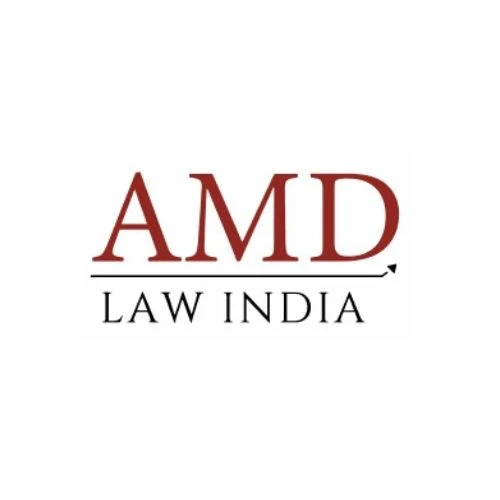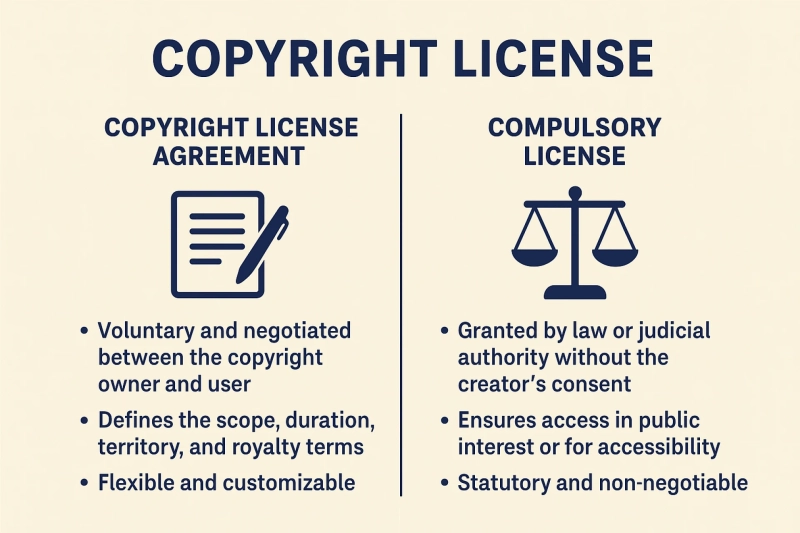Copyright is a legal right that grants creators exclusive control over their original works. However, there are certain circumstances where this exclusivity is limited in the public interest. One such mechanism is the copyright compulsory license. This concept ensures that creative works are made accessible when withholding them would harm cultural, educational, or societal development.
What is a Copyright Compulsory License?
A compulsory license in copyright is an authorization granted by law or a judicial authority that allows a third party to use a copyrighted work without the explicit consent of the copyright owner. Unlike voluntary licensing, where the owner negotiates and signs a copyright license agreement, compulsory licensing arises to balance private rights with public needs.
Legal Framework of Compulsory Licensing in Copyright
In India, the Indian Copyright Act, 1957 lays down the provisions for compulsory licensing. The Copyright Board (now merged with the Intellectual Property Appellate Board) or courts can grant such licenses under specific situations. These include works withheld from the public, translations required for educational purposes, or cases where access to copyrighted content is essential for public interest.
Situations Where Compulsory Licensing is Applicable
Unavailable Works – If a copyrighted book or artistic work is not available at a reasonable price, the public can seek a license to reproduce it.
Educational Use – Translating works into local languages for education is a common ground for granting compulsory licenses.
Public Interest – When withholding a work disrupts cultural or technological development, the law allows limited access through compulsory licensing.
Access for the Differently Abled – Licensing provisions extend to making works accessible to visually impaired or differently-abled individuals.
Copyright License Agreement vs. Compulsory License
A copyright license agreement is voluntary, negotiated between the owner and the user. It defines the scope, duration, territory, and royalty terms. Compulsory licensing, however, does not require the creator’s consent. Instead, it is granted by the authorities to prevent abuse of exclusive rights.
While copyright holders may feel it reduces their control, the law ensures they are compensated through statutory royalties. Thus, the balance between protecting intellectual property and ensuring public access is maintained.
Role of Compulsory Licensing in the Digital Age
With the rise of digital platforms, access to creative content has expanded globally. Yet, issues of affordability and availability persist. Compulsory licensing is becoming increasingly relevant in digital publishing, e-learning, and accessibility. For example, if a popular educational book is not available in India at reasonable cost, a license may be granted for its local publication, ensuring students can access it without financial burden.
Why Legal Guidance Matters
Navigating compulsory licensing in copyright requires professional expertise. Incorrect applications, missing documentation, or misunderstandings of statutory provisions can delay approvals. At AMD LAW INDIA, clients receive complete guidance on copyright compliance, licensing agreements, and disputes. Their team ensures creators’ rights are protected while enabling lawful access for users.
FAQs on Compulsory Licensing in Copyright
Q1: What is compulsory licensing in copyright?
It is a statutory license granted by authorities that allows use of a copyrighted work without the creator’s consent, under specific legal conditions.
Q2: How does a compulsory license differ from a copyright license agreement?
A copyright license agreement is voluntary and negotiated, while a compulsory license is mandated by law for public interest or accessibility reasons.
Q3: Do copyright owners get paid under compulsory licensing?
Yes. Even in compulsory licensing, the copyright owner receives fair compensation through royalties determined by law.
Q4: Can digital works be covered under compulsory licensing?
Yes. Digital books, educational content, and other online works can fall under compulsory licensing if they meet the legal conditions.
Q5: Why should I consult a copyright lawyer for licensing matters?
Expert legal support ensures compliance, protects your rights, and helps you avoid costly disputes in copyright licensing.



